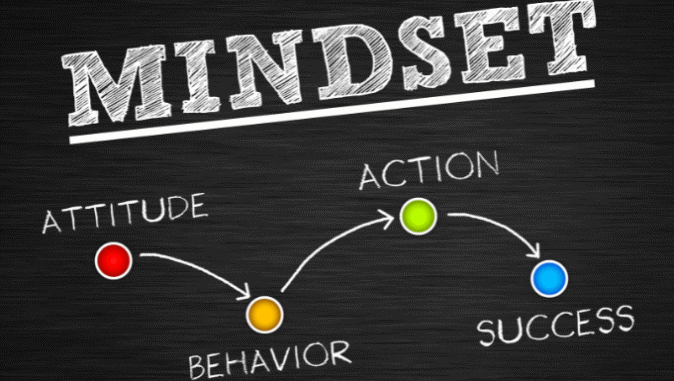Trading is not just about numbers, charts, or market strategies it’s a mental game as much as it is a technical one. While anyone can learn how to use indicators or analyze a candlestick pattern, the difference between consistent winners and those who wash out often lies in mindset.
Your psychology—how you respond to loss, how you manage stress, how patient and disciplined you are will define your success. Developing a strong trading mindset doesn’t happen by accident. It’s a conscious effort that parallels building physical fitness: it takes practice, time, and mental discipline.
Below are eight powerful, time-tested tips for developing a successful trading mindset. Whether you’re new to the game or a seasoned trader, these principles can transform how you approach the markets—and life itself.
1. Believe in Yourself and Your Potential
Before any external success can occur, it must be cultivated internally. Doubt is the quickest path to inconsistency, hesitation, and ultimately failure in trading. When you’re consumed by negative self-talk or overwhelmed by uncertainty, your brain struggles to make logical decisions. This opens the door to emotional trading, overleveraging, chasing losses, and second-guessing your analysis.
On the other hand, self-belief creates clarity. It empowers you to stay the course during drawdowns, stay disciplined to your trading plan, and avoid impulsive decisions. Confidence doesn’t mean being arrogant or overly optimistic—it means trusting in your system, your process, and your long-term vision.
Actionable Tip: Start each trading session by affirming your capability. Journaling your past wins and lessons learned can reinforce a positive feedback loop and enhance self-belief over time.
2. Cultivate Unshakable Commitment and Perseverance
Trading success does not happen overnight. It’s easy to be motivated in the beginning, but what separates professionals from amateurs is the ability to stay committed when the results aren’t immediate. The market will test your patience, discipline, and emotional control—often all at once.
You must be ready to put in the work day in and day out, even when profits are slow or losses mount. That means following your plan, showing up with discipline, and resisting the urge to jump ship during a losing streak.
Think long-term. A single trade doesn’t define you. Neither does a bad week or even a bad month. Keep your eyes on the bigger picture.
Actionable Tip: Set realistic, process-based goals (e.g., “I will follow my risk management rules for 30 trades straight”) instead of outcome-based goals like “I want to make $10,000 this month.”
3. Let Go of the Past—Learn and Move Forward
Every trader has experienced the sting of a painful loss or the regret of a missed opportunity. But dwelling on mistakes keeps you stuck. Mental energy is finite, and if you spend it obsessing over what you could’ve done differently, you rob yourself of the focus needed for your next trade.
The most successful traders don’t allow their past trades—whether wins or losses—to affect their next decision. They treat each setup independently and remain emotionally neutral.
Losses are not failures—they are tuition. Learn from them. Identify what went wrong, document it, and move forward stronger and wiser.
Actionable Tip: Use a trading journal not just to track trades, but to analyze your emotions, thought patterns, and recurring behaviors. Emotional awareness is the first step to emotional mastery.
4. Redefine Patience as Productive Action
Many think patience means sitting around and doing nothing. But in trading, patience is an active discipline. It’s about waiting for the right setup, the right market conditions, and the right risk-reward ratio. It’s about not forcing trades out of boredom or fear of missing out.
Great traders aren’t always in a trade—they know when not to trade is just as important as knowing when to act.
Patience also applies to the results. You won’t double your account every month. Sometimes the market is flat, your strategy isn’t aligning, or you’re just in a drawdown. Patience means trusting the process even when the results aren’t immediate.
Actionable Tip: Create a checklist of criteria that must be met before taking a trade. If even one is missing, sit out. This keeps your patience active and strategic.
5. Embrace Challenges—They’re Your Greatest Teachers
The road to trading success is littered with challenges. You will face losses, emotional breakdowns, self-doubt, and unexpected market events. The key is in how you respond.
Just like a sailor becomes skillful by navigating through storms, a trader becomes excellent by enduring—and learning from—market adversity. Instead of avoiding discomfort, embrace it. Growth lies on the other side of difficulty.
Every failed trade, every blown account (yes, even that), carries a lesson. Use it. Learn it. Grow from it.
Actionable Tip: After every tough trading day, write down one lesson learned and one thing you did well. This balances your mindset and maintains focus on growth, not just outcomes.
6. Master Emotional Detachment
Trading is a psychological rollercoaster. The highs of big wins can be as damaging as the lows of painful losses if they lead to overconfidence or revenge trading. Emotional detachment doesn’t mean not feeling anything it means not allowing emotions to dictate your actions.
You must train yourself to respond to wins and losses with the same calm neutrality. This is easier said than done, but emotional mastery separates professionals from gamblers.
When you detach emotionally, you trade with logic and discipline rather than fear and greed. This leads to more consistent performance and better risk management.
Actionable Tip: Practice “mental resets” between trades. After closing a trade, take a short walk, breathe deeply, and ask yourself: “Am I trading from emotion or discipline?”
7. Build a Routine That Reinforces Discipline
Your mindset isn’t just shaped during trading hours—it’s shaped by your daily habits and environment. The most successful traders operate like elite athletes: they have structured routines that support peak performance.
This includes a pre-market routine (e.g., chart analysis, journaling goals), an intra-day routine (e.g., sticking to a defined trading plan), and a post-market routine (e.g., reviewing trades, journaling lessons).
Structure keeps you grounded and focused. It reduces emotional decision-making and keeps you aligned with your strategy.
Actionable Tip: Design a personal trading routine and stick to it religiously for 21 days. Make adjustments based on what improves your focus and results.
8. Surround Yourself With the Right Community
You become the average of the five people you surround yourself with. In trading, isolation can lead to tunnel vision, burnout, and missed insights. Having a supportive network of like-minded traders can accelerate your growth.
A good trading community provides accountability, feedback, new perspectives, and emotional support during tough times. Whether it’s an online forum, a trading group, or a mentor, surrounding yourself with others who are striving toward similar goals reinforces your commitment.
Actionable Tip: Join a trading community or mastermind group where members share ideas, strategies, and progress. Engage actively and seek mentorship when needed.
Final Thoughts
You can have the best strategy, the fastest internet, and the latest trading tools—but if your mindset is weak, your results will be inconsistent at best.
Building a successful trading mindset isn’t about eliminating losses or being perfect. It’s about showing up every day with discipline, emotional control, resilience, and patience. It’s about becoming the type of person who can handle success and failure with equal grace.
Your mind is your greatest trading weapon. Train it, sharpen it, and guard it—and it will repay you with consistency, clarity, and confidence.
Vincent Nyagaka has been trading and analyzing markets for over 10+ years. He is a respected trader, author, and coach in financial markets, and is known as the authority on price action trading. At Eazypips, he shares practical strategies and trading lessons to guide aspiring traders toward consistent results.

